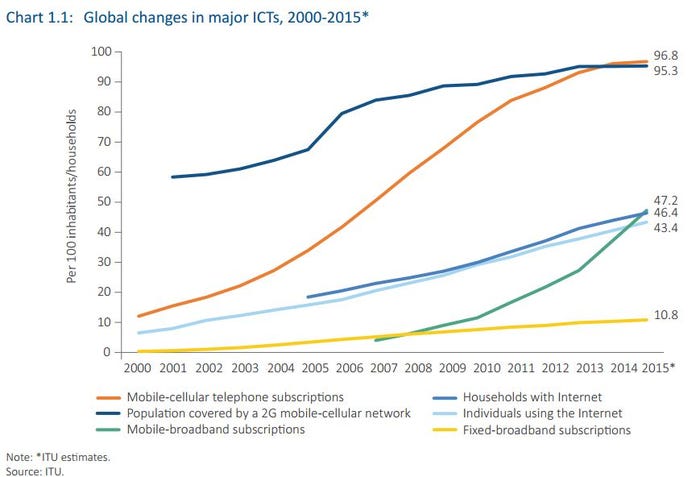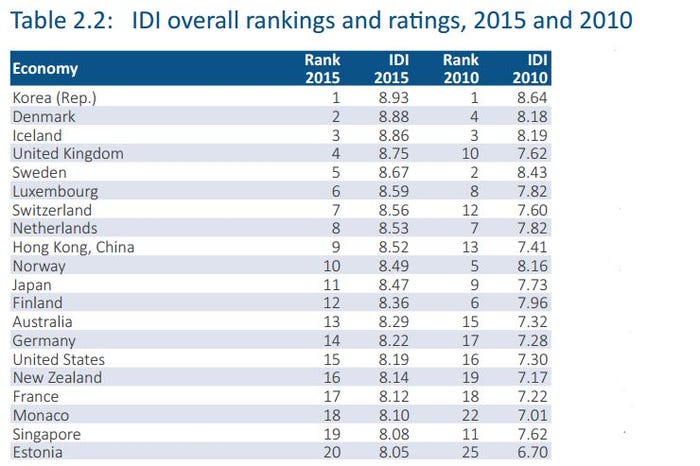Reports published by both the ITU and Ofcom have given an update on global and UK-centric connectivity, with the former stating that worldwide mobile broadband subscriptions have overtaken the number of households connected to internet for the first time.
December 1, 2015

Reports published by both the ITU and Ofcom have given an update on global and UK-centric connectivity, with the former stating that worldwide mobile broadband subscriptions have overtaken the number of households connected to internet for the first time.
 The report from the ITU claims that on a global scale, 47.2 per 100 inhabitants or households worldwide now utilise mobile broadband, with particularly steep growth occurring in the past two years. Mobile, it is said, has now overtaken the number of households with internet with 46.4 per 100.
The report from the ITU claims that on a global scale, 47.2 per 100 inhabitants or households worldwide now utilise mobile broadband, with particularly steep growth occurring in the past two years. Mobile, it is said, has now overtaken the number of households with internet with 46.4 per 100.
In addition, 96.8 of every 100 inhabitants around the world now subscribe to mobile-cellular telephony services, with 2G cellular networks as a minimum covering 95.3% of the global population. Although, it must be noted, the growth of both subscribers and coverage has plateaued over the past three to four years.
Elsewhere in its report, the ITU has laid out its vision and objectives for the next five years. The Connect 2020 Goals and Targets element of the report states that 55% of households around the world should be connected to the internet by 2020, with 60% of individuals benefitting from internet access. In addition, it specifically wants to see 50% of households in emerging markets connected. Among many other objectives, it wants to see ICT/telecommunications becoming 40% more affordable.
Europe appears to be leading the way in terms of ICT development, with 7 of the top 10 ranked countries coming from the continent. The ICT Development Index (IDI) is an algorithm used by the ITU to calculate the quality of ICT and telecoms connectivity uptake, quality and availability. According to the ITU, South Korea ranks top as expected, with Denmark, Iceland, UK and Sweden making up the rest of the top five. The top 20 countries, with their existing rank and that of 2010, are shown in the following table.
 While the ITU released its comprehensive global ICT and Telecoms report, Ofcom detailed the progress being made in the UK with mobile and broadband penetration and availability. According to the regulator, total mobile data usage across the country has shot up from 44.3Pb (petabytes) in 2014 to 72.9Pb in 2015, indicating a 65% growth. Per SIM, the average monthly data usage has risen from 0.53Gb last year to 0.87Gb this. With regards to 4G progress, the percentage of geographic area not covered by any mobile network has dropped from 76% to 52%, indicating strong progress in the last 12 months, but with plenty of work still to be done. A and B roads (dual-carriageways) across the country seem like major candidates for 4G coverage, with only 8% of all roads being covered by every 4G operator, and 47% not being covered by any at all.
While the ITU released its comprehensive global ICT and Telecoms report, Ofcom detailed the progress being made in the UK with mobile and broadband penetration and availability. According to the regulator, total mobile data usage across the country has shot up from 44.3Pb (petabytes) in 2014 to 72.9Pb in 2015, indicating a 65% growth. Per SIM, the average monthly data usage has risen from 0.53Gb last year to 0.87Gb this. With regards to 4G progress, the percentage of geographic area not covered by any mobile network has dropped from 76% to 52%, indicating strong progress in the last 12 months, but with plenty of work still to be done. A and B roads (dual-carriageways) across the country seem like major candidates for 4G coverage, with only 8% of all roads being covered by every 4G operator, and 47% not being covered by any at all.
Elsewhere in its report, Ofcom stated the number of wifi hotspots available up and down the country has risen by 7%, up to 44,804 from 41,798. Congruent with the trend of data consumption growth, average data usage per hotspot per month has risen from 54GB to 73GB (citing a sample month of June 2015). The same month saw total data transmitted over wifi hotspots rise nearly 50% from 2.3Pb to 3.3Pb.
Finally, Ofcom reckons 83% of premises in the UK are now covered and ready to be served by superfast broadband, which is defined as being download speeds of between 30 and 300 Mbit/s. While uptake is 27%, up from 21% last year, it indicates there’s still a significant market growth opportunity in the UK for operators delivering high-speed broadband. At the moment, take up of broadband of any speed is still on the rise, currently at 78% of premises.
“This year’s report shows good progress on the availability and take-up of communications services, which are now crucial in people’s personal and working lives,” said Ofcom. “However, the report recognises there is still more to do; particularly in improving broadband and mobile availability and quality of service for consumers and businesses around the country.”
About the Author(s)
You May Also Like








.png?width=300&auto=webp&quality=80&disable=upscale)


_1.jpg?width=300&auto=webp&quality=80&disable=upscale)


.png?width=800&auto=webp&quality=80&disable=upscale)